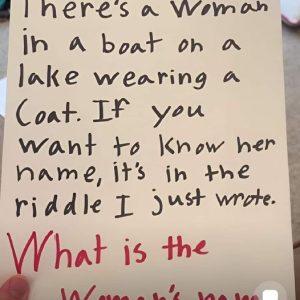Amidst the cacophony of the internet’s viral sensations, one peculiar video has captured the attention of global audiences. In this digital age where information spreads like wildfire, a seemingly ordinary American woman has become an unexpected protagonist in a narrative that challenges conventional notions of identity and societal norms.
The video, disseminated by a British commentator who ominously forewarned of societal collapse, features the American woman candidly sharing her perplexing ordeal. She reveals that her son, with an earnest conviction, identifies as a cat. What ensues is a discourse that traverses the boundaries of rationality, sparking debates on the fringes of acceptance and skepticism.
At the heart of the controversy lies the woman’s lamentation: despite her son’s steadfast identification as a feline, a veterinarian purportedly denied treatment, citing the undeniable reality of his human anatomy. It is this clash between subjective identity and objective reality that forms the crux of the woman’s grievance, casting a spotlight on the intricacies of discrimination and inclusion.
For the woman, her son’s assertion of being a cat transcends mere whimsy; it is a fundamental aspect of his being that warrants recognition and accommodation. In her impassioned plea for understanding, she asserts that her son’s self-professed identity should afford him the same rights and privileges as any other member of society. To her, the denial of veterinary care based on his human physiology is tantamount to discrimination—a stark reminder of the pervasive biases that persist in our ostensibly progressive world.
Despite her indignation, the woman maintains a stance of reluctant forbearance, opting not to pursue legal recourse against the veterinarian. Instead, she advocates for a broader societal shift in perception, advocating for the inclusion of individuals who identify beyond the confines of human norms. In her view, those who assert their identity as animals should be granted access to veterinary care—a plea that underscores the evolving landscape of identity politics and the imperative of compassionate understanding.
The dissemination of this video has catalyzed a spectrum of reactions, with conservative factions interpreting it as symptomatic of a society in decay. To them, the woman’s narrative represents a departure from traditional values and a harbinger of societal disintegration—a sentiment echoed in the dire warnings of the British commentator who first shared the video.
However, amidst the polarizing discourse, there emerges a poignant reflection on the complexities of human identity and the inexorable march of progress. The woman’s advocacy for her son’s recognition as a cat serves as a microcosm of broader struggles for acceptance and inclusivity, challenging preconceived notions of normalcy and inviting a more expansive understanding of what it means to be human.
In the final analysis, the viral video serves as a compelling testament to the multifaceted nature of contemporary society—a society grappling with the nuances of identity, discrimination, and social cohesion. It beckons us to confront our own biases and preconceptions, urging us to embrace the diversity of human experience with empathy and open-mindedness. For in the tapestry of humanity, it is the acceptance of difference that truly binds us together in commonality and compassion.
Amidst the cacophony of the internet’s viral sensations, one peculiar video has captured the attention of global audiences. In this digital age where information spreads like wildfire, a seemingly ordinary American woman has become an unexpected protagonist in a narrative that challenges conventional notions of identity and societal norms.
The video, disseminated by a British commentator who ominously forewarned of societal collapse, features the American woman candidly sharing her perplexing ordeal. She reveals that her son, with an earnest conviction, identifies as a cat. What ensues is a discourse that traverses the boundaries of rationality, sparking debates on the fringes of acceptance and skepticism.
At the heart of the controversy lies the woman’s lamentation: despite her son’s steadfast identification as a feline, a veterinarian purportedly denied treatment, citing the undeniable reality of his human anatomy. It is this clash between subjective identity and objective reality that forms the crux of the woman’s grievance, casting a spotlight on the intricacies of discrimination and inclusion.
For the woman, her son’s assertion of being a cat transcends mere whimsy; it is a fundamental aspect of his being that warrants recognition and accommodation. In her impassioned plea for understanding, she asserts that her son’s self-professed identity should afford him the same rights and privileges as any other member of society. To her, the denial of veterinary care based on his human physiology is tantamount to discrimination—a stark reminder of the pervasive biases that persist in our ostensibly progressive world.
Despite her indignation, the woman maintains a stance of reluctant forbearance, opting not to pursue legal recourse against the veterinarian. Instead, she advocates for a broader societal shift in perception, advocating for the inclusion of individuals who identify beyond the confines of human norms. In her view, those who assert their identity as animals should be granted access to veterinary care—a plea that underscores the evolving landscape of identity politics and the imperative of compassionate understanding.
The dissemination of this video has catalyzed a spectrum of reactions, with conservative factions interpreting it as symptomatic of a society in decay. To them, the woman’s narrative represents a departure from traditional values and a harbinger of societal disintegration—a sentiment echoed in the dire warnings of the British commentator who first shared the video.
However, amidst the polarizing discourse, there emerges a poignant reflection on the complexities of human identity and the inexorable march of progress. The woman’s advocacy for her son’s recognition as a cat serves as a microcosm of broader struggles for acceptance and inclusivity, challenging preconceived notions of normalcy and inviting a more expansive understanding of what it means to be human.
In the final analysis, the viral video serves as a compelling testament to the multifaceted nature of contemporary society—a society grappling with the nuances of identity, discrimination, and social cohesion. It beckons us to confront our own biases and preconceptions, urging us to embrace the diversity of human experience with empathy and open-mindedness. For in the tapestry of humanity, it is the acceptance of difference that truly binds us together in commonality and compassion.
Please follow and like us:




I don’t think the title of your article matches the content lol. Just kidding, mainly because I had some doubts after reading the article.
Thank you for your sharing. I am worried that I lack creative ideas. It is your article that makes me full of hope. Thank you. But, I have a question, can you help me?
Thank you for your sharing. I am worried that I lack creative ideas. It is your article that makes me full of hope. Thank you. But, I have a question, can you help me?
My spouse and I absolutely love your blog and find almost all of your post’s to be just what I’m looking for. Would you offer guest writers to write content to suit your needs? I wouldn’t mind producing a post or elaborating on a number of the subjects you write in relation to here. Again, awesome website!
http://1119732.net/top-10-headlight-sealing-mistakes.html
Great! Thank you so much for sharing this. Visit my websitee: free stresser
Hi there to every one, it’s in fact a fastidious for me to visit this web site, it consists of priceless Information.
https://05161.com.ua/yak-pidvishchiti-bezpeku-na-dorozi-za-dopomogoyu-yakisnih-linz-u-farah
It is the best time to make some plans for the future and it is time to
be happy. I have read this post and if I could I want to suggest you few interesting things or suggestions.
Maybe you can write next articles referring to this article.
I want to read more things about it!
all the time i used to read smaller articles that as well
clear their motive, and that is also happening with this piece of writing which I am reading here.
I’d like to thank you for the efforts you’ve put in penning this site.
I really hope to view the same high-grade content by you in the future as well.
In truth, your creative writing abilities has encouraged me to get my very own blog
now 😉
I’m not sure exactly why but this blog is loading incredibly slow for me.
Is anyone else having this issue or is it a issue on my end?
I’ll check back later on and see if the problem still exists.
Hi, constantly i used to check web site posts here in the early hours in the daylight, since i love to gain knowledge of more and more.
ответ на игру words of wonders
Hi there, after reading this remarkable paragraph i am also delighted to share my knowledge here with friends.
ответы на игру слова
Wow, wonderful blog layout! How long have you been blogging for? you made blogging look easy. The overall look of your site is excellent, as well as the content!
ответы на игру слова все уровни
Hi to every single one, it’s in fact a nice for me to visit this website, it consists of useful Information.
Wow! In the end I got a web site from where I can in fact take helpful facts concerning my study and knowledge.
Hi there Dear, are you truly visiting this web site daily, if
so afterward you will without doubt take good experience.
Its not my first time to go to see this web site, i am browsing this web page dailly
and get fastidious data from here everyday.
What’s up friends, how is the whole thing, and what you would like to say on the topic of
this piece of writing, in my view its really amazing in favor of me.
I was able to find good information from your blog posts.
Wow, marvelous weblog structure! How long have
you ever been blogging for? you make blogging glance easy.
The total glance of your site is wonderful, let alone the content!
Great post. I was checking constantly this blog and I am impressed!
Very helpful information specially the closing part 🙂 I care for such information a lot.
I was seeking this particular information for a very lengthy time.
Thanks and good luck.
Hey There. I found your blog using msn. This is a very well written article.
I will be sure to bookmark it and come back to read more
of your useful info. Thanks for the post. I’ll certainly comeback.
Hi! Quick question that’s totally off topic.
Do you know how to make your site mobile friendly?
My weblog looks weird when viewing from my iphone 4.
I’m trying to find a theme or plugin that might be able to correct this issue.
If you have any suggestions, please share.
Thanks!
whoah this blog is wonderful i like reading your posts.
Stay up the good work! You realize, lots of individuals are looking round for this information, you
could aid them greatly.
I don’t think the title of your article matches the content lol. Just kidding, mainly because I had some doubts after reading the article. https://accounts.binance.com/ru-UA/register?ref=OMM3XK51
I’m really enjoying the theme/design of your blog. Do you ever run into any internet browser compatibility
problems? A number of my blog audience have complained about my website not working correctly in Explorer but looks great in Chrome.
Do you have any suggestions to help fix this problem?
Hi! Would you mind if I share your blog with my myspace group? There’s a lot of people that I think would really appreciate your content. Please let me know. Many thanks
Кодирование на 3 месяца от алкоголизма в Самаре цены, препараты для кодировки от алкоголя сроком на 3 месяца
It’s awesome to pay a visit this web site and reading the views of all colleagues regarding this paragraph, while I am also keen of getting know-how.
флайд борист
Rejestracja w Mostbet zajmuje tylko chwilę, a bonusy czekają od razu | Mostbet logowanie jest intuicyjne i nie sprawia żadnych trudności | Dzięki Mostbet logowanie możesz grać w swoje ulubione gry w kilka sekund Mostbet Polska – kasyno i zakłady
Rejestracja w Mostbet zajmuje tylko chwilę, a bonusy czekają od razu | Mostbet logowanie jest intuicyjne i nie sprawia żadnych trudności | Mostbet kasyno oferuje darmowe spiny i turnieje z nagrodami http://www.mostbet.com
Kasyno Mostbet oferuje setki automatów i gier na żywo | Z Mostbet możesz zagrać na automatach, ruletce i w pokera | Mostbet kasyno oferuje darmowe spiny i turnieje z nagrodami kasyno mostbet online
Kasyno Mostbet oferuje setki automatów i gier na żywo | Dzięki bonusowi powitalnemu w Mostbet zaczniesz grę z przewagą | Mostbet kasyno oferuje darmowe spiny i turnieje z nagrodami mostbet.com
Ten serwis świetnie porównuje oferty bonusów kasynowych | Sprawdzona strona dla graczy online w Polsce | Strona rzetelna, bezpieczna i przyjazna graczom | Przyjazny interfejs i łatwość poruszania się po stronie | Legalne zakłady esportowe w jednym miejscu | Funkcjonalna wyszukiwarka kodów promocyjnych | Opisane wszystkie metody płatności dostępne w kasynach | Doskonałe kasyna z grami typu slot i ruletka | Szybka rejestracja i natychmiastowy bonus powitalny cashback zakłady bukmacherskie.
Wybór odpowiedniego kasyna online może być trudny, ale ta strona ułatwia decyzję | Ranking kasyn online naprawdę ułatwia orientację na rynku | Przydatne porady jak wypłacić pieniądze z konta | Kasyna z najwyższymi ocenami dostępne od ręki | Serwis idealny dla nowych i doświadczonych graczy | Ranking kasyn ze szczegółowymi opiniami graczy | Oferty kasyn z rejestracją w kilka kliknięć | Kasyno online z najlepszymi ocenami – wszystko jasne | Kasyno online z najlepszym wyborem gier najlepsi bukmacherzy internetowi.
Rejestracja szybka i intuicyjna – zyskałem bonus bez depozytu | Świetny poradnik jak odebrać bonus bez depozytu krok po kroku | Szybki dostęp do logowania i promocji | Ciekawie opisane doświadczenia graczy z Polski | Strona wspiera wybór najlepszych bonusów bukmacherskich | Porównywarka kasyn idealna do szybkiego wyboru | Możliwość gry bez depozytu – duży atut tej strony | Fajne porady dla graczy początkujących i zaawansowanych | Dostępność wsparcia technicznego i FAQ bukmacherzy z cashbackiem.
Fajne zestawienie kasyn z płatnościami BLIK i przelewy24 | Wszystko w jednym miejscu – kasyna, zakłady, promocje | Szybki dostęp do logowania i promocji | Nowe promocje aktualizowane na bieżąco | Znalazłem idealne kasyno z promocją cashback | Porównywarka kasyn idealna do szybkiego wyboru | Bezpieczne zakłady bukmacherskie bez depozytu | Doskonałe kasyna z grami typu slot i ruletka | Szybka rejestracja i natychmiastowy bonus powitalny najlepsi bukmacherzy internetowi.
Mostbet umożliwia szybkie i bezpieczne transakcje finansowe. | Doświadczeni gracze docenią zaawansowane funkcje Mostbet. | Mostbet to platforma przyjazna zarówno dla początkujących, jak i zaawansowanych graczy. | Dołącz do społeczności graczy Mostbet i dziel się doświadczeniami. kasyno mostbet
Mostbet oferuje zakłady na żywo z atrakcyjnymi kursami. | Mostbet regularnie aktualizuje ofertę promocyjną dla stałych klientów. | Dołącz do turniejów i wyzwań organizowanych przez Mostbet. | Mostbet zapewnia szybkie wypłaty wygranych na Twoje konto. mostbet online
Mostbet oferuje szeroki wybór gier kasynowych i zakładów sportowych. | Graj odpowiedzialnie i korzystaj z narzędzi kontroli w Mostbet. | Mostbet oferuje gry od renomowanych dostawców oprogramowania. | Korzystaj z promocji cashback dostępnych w Mostbet. https://mostbet-online-casino-polska.com
Mostbet umożliwia szybkie i bezpieczne transakcje finansowe. | Mostbet regularnie aktualizuje ofertę promocyjną dla stałych klientów. | Mostbet oferuje wysokie kursy na zakłady sportowe. | Dołącz do społeczności graczy Mostbet i dziel się doświadczeniami. https://mostbet-online-casino-polska.com
Na Mostbet najdete výhodné bonusy a promo akce | Mostbet má skvělou mobilní aplikaci pro České uživatele | S Mostbet máte jistotu kvalitní podpory mostbet online game.
Hráči ocenují rychlé výběry u Mostbet | Zaregistrujte se na Mostbet cz a získejte bonus | Mostbet online casino nabízí jackpoty a turnaje mostbet přihlášení.
Mostbet je spolehlivá platforma pro sázení i kasino | Mostbet nabízí kasino s živými dealery | Vyzkoušejte sázení na Mostbet a uvidíte rozdíl mostbet přihlášení.
Mostbet je spolehlivá platforma pro sázení i kasino | Nejlepší automaty najdete v Mostbet casino cz | Zákaznická podpora Mostbet je k dispozici 24/7 mostbet com.